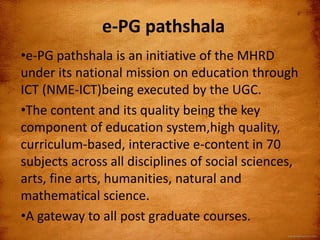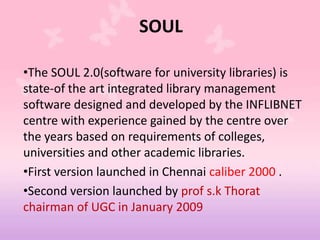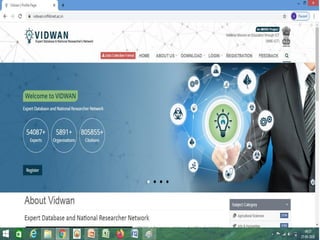INFLIBNET
- 1. (Re- accredited by NAAC with ‘A’ Grade) ATTOOR
- 2. INFLIBNET •An autonomous IUC Of UGC •Headquarter in Gujarat University campus •Established in 1991 •Started as a project under IUCAA •It became an interdependent IUC in June 1996
- 3. OBJECTIVES • To promote and implement computerization. • To evolve standards and uniform guidelines. • To provide reliable access to document collection of libraries. • To provide access to bibliographic information sources.
- 4. • To develop new methods and techniques for archival. • To optimize information resources utilization. • To create database of projects, institutions, specialists etc. • To encourage co-operation among libraries, documentation centres and information centres in the country.
- 5. FUNCTIONS •To facilitate academic communication. •To undertake system design and studies in the field of communications, computer networking, information handling and data management. •To establish appropriate control and monitoring system for the communication network and organize maintenance. •To collaborate with institutions, libraries, information centres and other organizations. •To generate revenue.
- 6. GOALS • Achieve complete automation of libraries in educational institutions. • Create union catalogues of documents available in libraries in online and real –time environment. •Promote digitization of legacy documents and creation of content in e-format in universities. •Promote setting up of open access digital repositories in universities.
- 7. MAJOR ACTIVITIES •e- consortium UGC-INFONET DLC N-LIST Program •e-PGPathshala •Indcat union database •Open access initiative INFOPORT IR@INFLIBNET OJAS shodhganga shodhgangotri •Research project •SOUL •Vidwan database
- 8. UGC-INFONET DLC •The UGC- infonet digital library consortium was formally launched in december,2003 by honourable president of india Dr A.P.J.abdul kalam. •To provide the internet connectivity to the universities in the year 2003 under UGC –infonet programme. •University libraries which have been discontinuing subscription of scholarly journals because of “serial crisis”. •The term serial crisis refers to exponential and continuing increase in subscription cost of scholarly journals.
- 10. N-LIST The project entitled “National library and information services infrastructure for scholarly content(N-LIST)”,being jointly executed by the e-shodhsindhu consortium and INDEST-AICTE consortium. The N-LIST project provides access to e- resources to students, researchers and faculty from college and other beneficiary institutions.
- 11. e-PG pathshala •e-PG pathshala is an initiative of the MHRD under its national mission on education through ICT (NME-ICT)being executed by the UGC. •The content and its quality being the key component of education system,high quality, curriculum-based, interactive e-content in 70 subjects across all disciplines of social sciences, arts, fine arts, humanities, natural and mathematical science. •A gateway to all post graduate courses.
- 13. INDcat union database •INDcat: online union catalogue of Indian universities. •It contain bibliographic records of books, theses and serials contributed by participating universities in all disciplines. • i.e computer science, philosophy, religion, social science, technology, arts, literature, history and science. •Currently indcat has more than 95.93 lakhs unique bibliographic records of book, thesis and serial database.
- 14. INFOPORT
- 15. INFOPORT •INFOPORT of INFLIBNET centre boost indian scholarly content. •It is the subject gateway of the electronic resource of the India. •It basically provide the e-resource of the Indian scholar that scatter in the web into one place. •Support the different interface like browsing, searching and so on. •The team behind the INFOPORT collect the resource by contact to the scholar and librarian from the different colleges and universities in India.
- 16. IR@INFLIBNET
- 17. IR@INFLIBNET •INFLIBNET centre build its own institutional repository by using Dspace Digital library software. •This repository have only those content that is clipping the media, seminar and conference proceeding(planner, caliber) and INFLIBNET publication(annual report, newsletter) OJAS INFLIBNET centre has discontinued the OJAS services with effect from 31 march 2018
- 18. shodhganga
- 19. shodhganga •Shodhganga is the electronic dissertation and thesis digital repository. •Shodh stand for “research and discovery" of the researcher output that originate from the Sanskrit word . •Ganga stand for the largest repository of the scholar output, in India gangs is the holiest, longest, larger river. •On 5th may 2016 UGC mandates the e-these and e- dissertation submission of the researcher in the universities to initiate the open access to the scholarly community world wide. •The main purpose behind the shodhganga is to facilitate the open access, to improve the quality of research output ,to decrease the duplication of works.
- 20. shodhgangotri
- 21. shodhgangotri •Shodhgangotri is the digital repository of the e- synopses and e-research proposals of the research scholar of the institute for their PHD programme that are deposit and approved by the universities. •Shodh stands for the “research and discovery” and ganotri stand for the origination of the ganga river.
- 22. Research project
- 23. Research project •Research project database is details of the accomplished and ongoing funded projects carried out by various faculty members working at various universities in India. •It contain more than 13600 research projects information funded by various funding agencies viz UGC,ICAR,ICMR,DST and DBT etc. •The details of the project information have been collected from the project directors and funding agencies.
- 24. SOUL
- 25. SOUL •The SOUL 2.0(software for university libraries) is state-of the art integrated library management software designed and developed by the INFLIBNET centre with experience gained by the centre over the years based on requirements of colleges, universities and other academic libraries. •First version launched in Chennai caliber 2000 . •Second version launched by prof s.k Thorat chairman of UGC in January 2009
- 26. VIDWAN database
- 27. VIDWAN database •The INFLIBNET VIDWAN database gives the information of the expert of the various fields and research network in India. •It also provides the information about the expert of their publication, background, experience . •The main aim to build this database is the information exchanges and networking opportunities among the scientist.
- 28. INFLIBNET services 1. Catalogue based service 2. Database service 3. Document supply service 4. Collection development 5. Communication based service
- 29. INFLIBNET resources 1. University catalogue 2. R&D library catalogue 3. National library catalogue 4. National union catalogue 5. Indigenous database
- 30. Conference and workshops INLIBNET conducts an annual event called convention on autonomous of libraries in educational and research institutions(CALIBER) on different places in India.
- 31. PLANNER: promotion of library automation and networking in north eastern region. The topic is recent & related to library automation. It also supports workshops all over India which are related to libraries
- 32. References • Dhiman Anil.k.,& Sinha Suresh.c., (2002).,Academic libraries., Ess Ess publication., New Delhi. • https://inflibnet.ac.in.com • https://nlist.inflibnet.ac.in.com • https://shodhganga.inflibnet.ac.in.com • https://vidwan.inflibnet.ac.in.com
































